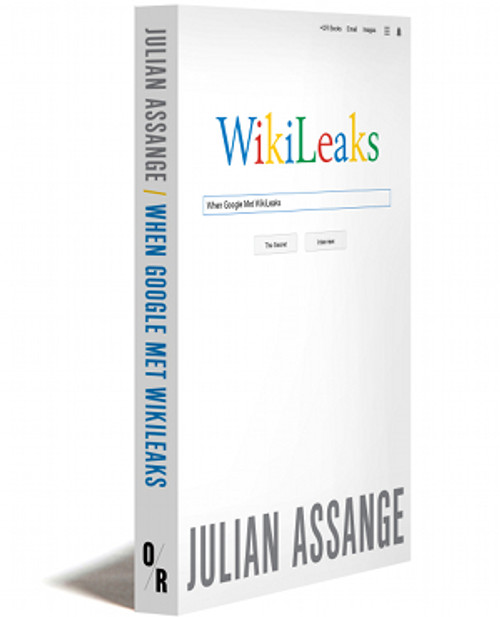Women, Whistleblowing, WikiLeaks
about the bookabout
The most controversial activist organization of the 21st century, WikiLeaks has attracted strong, divergent opinions from across the political spectrum. Lauded by its supporters for its indispensable role in holding governments, corporations, and human rights abusers to account, its advocates and journalists have been excoriated by opponents as traitors, threats to legitimate governments, and misogynists. Yet so much media attention is focused upon founder Julian Assange, that the broader dimensions of WikiLeaks are rarely aired. Especially critical in these omissions is the role of women, both in the organization and the more general struggle for information freedom.
Women, Whistleblowing, WikiLeaks presents a conversation between three extraordinary advocates who have been at the forefront of such activity: acclaimed journalist and human rights advocate Sarah Harrison, Croatian-German theater director, activist and author Angela Richter, and Renata Avila, a celebrated Guatemalan human rights lawyer and digital rights expert. Ranging widely, from the dishonesty of the mainstream media and its contrasting treatment of Edward Snowden and Chelsea Manning to the terrifying monopolization of personal data under tech behemoths such as Facebook and Google, this book is a crucial intervention in the ongoing debate around digital activism.
All royalties from this book support the Courage Foundation's work defending journalists and whistleblowers worldwide.
“It’s been striking to me that, in my years of working in the world of digital activism, from WikiLeaks to a diverse range of internet groups, women are active and hold important positions, yet are seldom prominent. This is not because women lack the assertiveness to occupy a role in the foreground, as is so often claimed with a certain paternalism. It stems, in part, from the unwillingness of mainstream media to appreciate and fairly report the role of women … How else can one explain the description in the German weekly Der Spiegel’s (to just take one prominent example) of Sarah Harrison after her return to Europe from Moscow [where she had accompanied Edward Snowden on his escape from Hong Kong] as an ‘assistant’ or ‘friend’ of Assange, instead of describing her as a brave, independent journalist?”
—Angela Richter, from the Introduction
About The Author / Editor
Preview
Foreword: The Dusk of Male Backroom Politics
Angela Richter, May 2017
The idea for this book originated in 2013 at the celebration of the European Center for Constitutional and Human Rights (ECCHR) in Berlin. It was there that I met Sarah Harrison who, three days previously, had returned from Moscow where she had spent several months with the NSA whistleblower Edward Snowden. I had known Sarah for two years as a result of my work with WikiLeaks and its founder Julian Assange. Sarah was the closest of collaborators, trusted by Assange and a passionate journalist with WikiLeaks. She had travelled to Hong Kong for the organization and had helped Edward Snowden escape after his announcement that he was the NSA whistleblower. She intervened as his situation was becoming increasingly difficult. By the time she arrived in Hong Kong, Snowden was on his own. The filmmaker Laura Poitras and the journalist Glenn Greenwald had already left the city, as had the journalists from the Guardian and the Washington Post, who departed with the NSA documents in their baggage.
Snowden’s stay in Hong Kong, documented by Poitras in the Oscar-winning film Citizenfour, was actually only the beginning of a real life espionage thriller that took place between Hong Kong and Moscow. Sarah’s intervention was a classic David versus Goliath story: One woman against the global reach of the USA, the world’s greatest superpower. With the help of Assange, who was by then already confined to asylum in the Ecuadorian embassy, Sarah managed to outsmart the mightiest secret service in the world to rescue Snowden. She stayed with him after the successful escape to Moscow, first for weeks in a windowless room in the transit zone of Moscow’s Sheremetyevo airport, and then for many more months in the city. She did not leave for her voluntary exile in Berlin until she knew that Snowden was safe.
Sarah and I were planning to get together for a talk about whistleblowing, WikiLeaks, and Snowden. I asked her about the possibility of publishing our conversation on 60pages.com. Sarah said she liked the idea, but wanted to think about it for a few days. In the end we decided to invite another friend to join our discussion, Guatemalan human rights lawyer Renata Avila, who had been helping Julian Assange legally for years and who is also one of the trustees of the Snowden defense fund, where she works on strategies and campaigns aimed at keeping him safe and secure.
The idea was to bring together a trio of women from different backgrounds and parts of the world for a conversation about an area of activity that is widely perceived as heavily male dominated: whistleblowing and digital dissidence. This is an impression that is fostered by the mainstream media that focuses heavily on key male players in the field, most notably, of course, Snowden and Assange, as well as the journalist Glenn Greenwald. Chelsea Manning is a notable exception in this although, in spite of the fact that she has spoken publicly about her life as a transgender woman, she is still referred to widely as “he” in a largely unsympathetic press.
in the media
Women, Whistleblowing, WikiLeaks
about the bookabout
The most controversial activist organization of the 21st century, WikiLeaks has attracted strong, divergent opinions from across the political spectrum. Lauded by its supporters for its indispensable role in holding governments, corporations, and human rights abusers to account, its advocates and journalists have been excoriated by opponents as traitors, threats to legitimate governments, and misogynists. Yet so much media attention is focused upon founder Julian Assange, that the broader dimensions of WikiLeaks are rarely aired. Especially critical in these omissions is the role of women, both in the organization and the more general struggle for information freedom.
Women, Whistleblowing, WikiLeaks presents a conversation between three extraordinary advocates who have been at the forefront of such activity: acclaimed journalist and human rights advocate Sarah Harrison, Croatian-German theater director, activist and author Angela Richter, and Renata Avila, a celebrated Guatemalan human rights lawyer and digital rights expert. Ranging widely, from the dishonesty of the mainstream media and its contrasting treatment of Edward Snowden and Chelsea Manning to the terrifying monopolization of personal data under tech behemoths such as Facebook and Google, this book is a crucial intervention in the ongoing debate around digital activism.
All royalties from this book support the Courage Foundation's work defending journalists and whistleblowers worldwide.
“It’s been striking to me that, in my years of working in the world of digital activism, from WikiLeaks to a diverse range of internet groups, women are active and hold important positions, yet are seldom prominent. This is not because women lack the assertiveness to occupy a role in the foreground, as is so often claimed with a certain paternalism. It stems, in part, from the unwillingness of mainstream media to appreciate and fairly report the role of women … How else can one explain the description in the German weekly Der Spiegel’s (to just take one prominent example) of Sarah Harrison after her return to Europe from Moscow [where she had accompanied Edward Snowden on his escape from Hong Kong] as an ‘assistant’ or ‘friend’ of Assange, instead of describing her as a brave, independent journalist?”
—Angela Richter, from the Introduction
About The Author / Editor
Preview
Foreword: The Dusk of Male Backroom Politics
Angela Richter, May 2017
The idea for this book originated in 2013 at the celebration of the European Center for Constitutional and Human Rights (ECCHR) in Berlin. It was there that I met Sarah Harrison who, three days previously, had returned from Moscow where she had spent several months with the NSA whistleblower Edward Snowden. I had known Sarah for two years as a result of my work with WikiLeaks and its founder Julian Assange. Sarah was the closest of collaborators, trusted by Assange and a passionate journalist with WikiLeaks. She had travelled to Hong Kong for the organization and had helped Edward Snowden escape after his announcement that he was the NSA whistleblower. She intervened as his situation was becoming increasingly difficult. By the time she arrived in Hong Kong, Snowden was on his own. The filmmaker Laura Poitras and the journalist Glenn Greenwald had already left the city, as had the journalists from the Guardian and the Washington Post, who departed with the NSA documents in their baggage.
Snowden’s stay in Hong Kong, documented by Poitras in the Oscar-winning film Citizenfour, was actually only the beginning of a real life espionage thriller that took place between Hong Kong and Moscow. Sarah’s intervention was a classic David versus Goliath story: One woman against the global reach of the USA, the world’s greatest superpower. With the help of Assange, who was by then already confined to asylum in the Ecuadorian embassy, Sarah managed to outsmart the mightiest secret service in the world to rescue Snowden. She stayed with him after the successful escape to Moscow, first for weeks in a windowless room in the transit zone of Moscow’s Sheremetyevo airport, and then for many more months in the city. She did not leave for her voluntary exile in Berlin until she knew that Snowden was safe.
Sarah and I were planning to get together for a talk about whistleblowing, WikiLeaks, and Snowden. I asked her about the possibility of publishing our conversation on 60pages.com. Sarah said she liked the idea, but wanted to think about it for a few days. In the end we decided to invite another friend to join our discussion, Guatemalan human rights lawyer Renata Avila, who had been helping Julian Assange legally for years and who is also one of the trustees of the Snowden defense fund, where she works on strategies and campaigns aimed at keeping him safe and secure.
The idea was to bring together a trio of women from different backgrounds and parts of the world for a conversation about an area of activity that is widely perceived as heavily male dominated: whistleblowing and digital dissidence. This is an impression that is fostered by the mainstream media that focuses heavily on key male players in the field, most notably, of course, Snowden and Assange, as well as the journalist Glenn Greenwald. Chelsea Manning is a notable exception in this although, in spite of the fact that she has spoken publicly about her life as a transgender woman, she is still referred to widely as “he” in a largely unsympathetic press.










